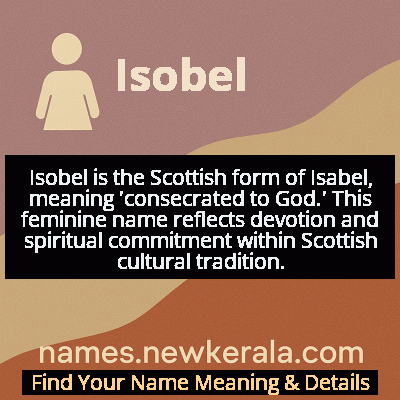Isobel Name Meaning & Details
Origin, Popularity, Numerology Analysis & Name Meaning of Isobel
Discover the origin, meaning, and cultural significance of the name ISOBEL. Delve into its historical roots and explore the lasting impact it has had on communities and traditions.
Name
Isobel
Gender
Female
Origin
Scottish
Lucky Number
8
Meaning of the Name - Isobel
Isobel is the Scottish form of Isabel, meaning 'consecrated to God.' This feminine name reflects devotion and spiritual commitment within Scottish cultural tradition.
Isobel - Complete Numerology Analysis
Your Numerology Number
Based on Pythagorean Numerology System
Ruling Planet
Saturn
Positive Nature
Ambitious, efficient, realistic, and authoritative.
Negative Traits
Materialistic, stressed, confrontational, and can be overly ambitious.
Lucky Colours
Dark blue, black.
Lucky Days
Saturday.
Lucky Stones
Blue sapphire, amethyst.
Harmony Numbers
2, 4, 6.
Best Suited Professions
Business leaders, managers, financial services, law enforcement.
What People Like About You
Leadership, determination, organizational skills.
Famous People Named Isobel
Isobel Baillie
Opera Singer
Renowned Scottish soprano who performed with major orchestras and became one of Britain's most celebrated oratorio singers
Isobel Gowdie
Historical Figure
Scottish woman who gave one of the most detailed voluntary confessions of witchcraft in European history
Isobel Campbell
Musician
Scottish singer-songwriter and cellist, former member of Belle and Sebastian, known for her collaborations with Mark Lanegan
Name Variations & International Equivalents
Click on blue names to explore their detailed meanings. Gray names with will be available soon.
Cultural & Historical Significance
The name's persistence through centuries reflects Scotland's unique position between Celtic traditions and broader European connections. During the 19th century, Isobel became particularly associated with Scottish literary and artistic circles, often chosen by families who valued both Scottish identity and European cultural sophistication. The name also appears frequently in Scottish folklore and historical records, serving as a testament to its enduring appeal across different social classes. Today, Isobel remains a symbol of Scottish cultural pride while maintaining its elegant, timeless quality that transcends geographical boundaries.
Extended Personality Analysis
Women named Isobel are often perceived as possessing a blend of traditional values and independent thinking. They typically exhibit intelligence, creativity, and a strong sense of personal integrity that aligns with the name's meaning of being 'consecrated to God.' The Scottish variant particularly suggests a connection to heritage and cultural roots, often resulting in individuals who value family traditions while maintaining modern perspectives. Isobels are frequently described as thoughtful and analytical, with a quiet confidence that doesn't need constant validation.
This combination of traits often makes Isobels excellent mediators and problem-solvers who can see multiple sides of an issue. They tend to be loyal friends and partners, showing steadfastness in relationships and commitments that reflects the name's connotations of devotion. Their practical nature is balanced by a rich inner world and artistic sensibility, making them both grounded and imaginative. The Scottish heritage of the name often translates into a strong work ethic and resilience, characteristics valued in Scottish culture. Isobels typically approach life with a sense of purpose and moral clarity, making them natural leaders who inspire trust through their consistency and principle-driven actions.
Modern Usage & Popularity
In contemporary times, Isobel has experienced a resurgence in popularity, particularly in Scotland and among those of Scottish descent worldwide. While never reaching the overwhelming popularity of Isabella, Isobel maintains a steady presence as a sophisticated alternative that honors Scottish heritage. The name appeals to parents seeking a classic name with historical depth that isn't overly common. In recent years, it has ranked consistently within the top 200 names in Scotland and has gained traction in other English-speaking countries as part of the trend toward vintage names with cultural significance. Its spelling distinguishes it from the more common Isabella while maintaining the same elegant sound and meaningful background, making it particularly attractive to parents who value both tradition and individuality in name selection.
Symbolic & Spiritual Meanings
Symbolically, Isobel represents devotion, integrity, and cultural continuity. The name's core meaning of being 'consecrated to God' extends metaphorically to represent commitment to one's principles and values, suggesting a person who lives with purpose and moral conviction. In Scottish context, it symbolizes the preservation of cultural identity while embracing external influences—much like Scotland itself has maintained its distinct character while engaging with broader European culture. The name also carries connotations of strength through quiet determination rather than overt power, reflecting the Scottish characteristic of steadfast perseverance in the face of challenges. Additionally, Isobel symbolizes the bridge between tradition and modernity, honoring historical roots while remaining relevant in contemporary society, and represents the enduring power of cultural heritage in shaping personal identity.

